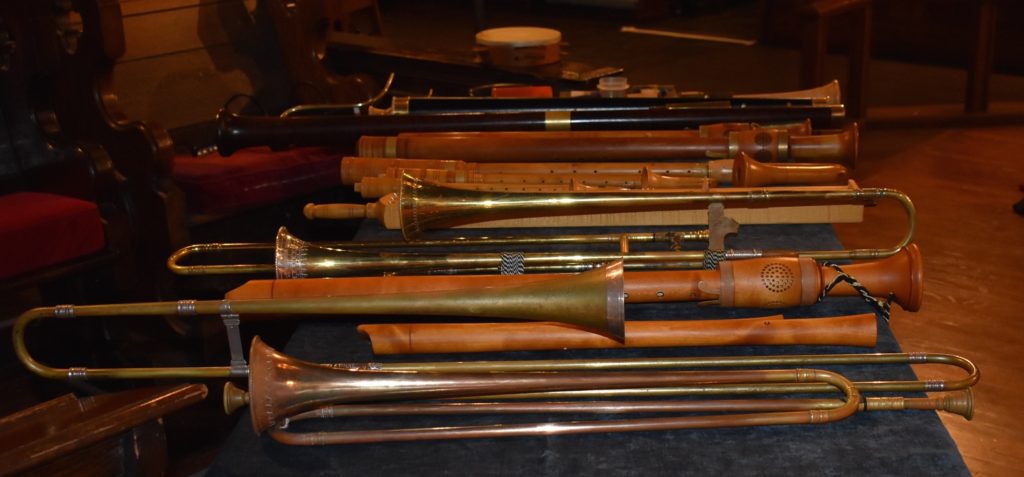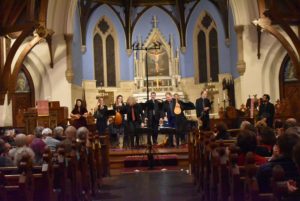
Is it anachronistic to seek out Renaissance music in this age of cybernetics? The beauty of Piffaro is that they take advantage of every modern medium to achieve historically informed Renaissance performances. As we approached St. Mary’s Hamilton for the Tydings Trew: Caroling in Early England concert, the drizzling rain and dark night also created an atmosphere in which the cold world of the sixteenth century was not hard to envision.
The Piffaro ensemble has each musician play several different instruments – switching off in a smooth and choreographed manner. The Tydings Trew program including familiar carols from England – some of them surprisingly secular and even salacious – with music taken from historical resources including secular tunes from Henry VIII’s Book, revealing the musical talents of the notorious king.
Guest musician Mark Rimple played lute, gittern, psaltery, and viol, and sang counter-tenor in a quiet and unobtrusive voice which was not the blaring high alto many associate with today’s counter-tenors.
Nell Snaidas, soprano, and Karim Sulayman, tenor sang many of the tunes in solos and in duet. Their voices blended so beautifully in Remember O thou man by Thomas Ravenscroft (1582-1633) that I would have loved to have suspended the moment.

Snaidas also sang a duet with the alto recorder played by Priscilla Herreid. Herreid was able to create a vocal quality to her softly sustained recorder notes which so closely matched the focused clarity of Snaidas’ soprano that the blend of the two became a subtle weave of sound fabric.
The instrumental interludes ran the gamut of sound types from the sweet sounds of recorders, dulcians, sackbuts, and lutes to the grittier and reedy sounds of shawm, bagpipes, and krumhorns. The Piffaro players moved so quickly from instrument to instrument that one wonders how they remember where to go and what instrument to pick from the large tables laid out with myriad woodwinds.
The sackbuts, ancestor of the trombone, and the slide trumpet were so smoothly played by Greg Ingles and Erik Schmalz that they sounded as if an organ were being played with the softest of registration. The smooth dulcians lulled the listener until they were abruptly awoken by the nasal reverberations of krummhorns. Then the reedy sounds of Joan Kimball’s energetic bagpipe playing ushered in a sharper dancing edge to the music.
There were several songs supported by the two lutenists, Grant Herreid and Mark Rimple, and their duet on an intricate version of the familiar tune of Greensleeves had the crystalline and delicate quality of a musical miniature.
The harmonies produced both by the instruments and voices were often surprising, jumping by halftones when the modern ear expects a progression of a fourth or fifth. The vocal parts were sung with subtle nuances, long melismas, and intriguingly intricate chord progressions, especially in the trio All sons of Adam taken from the Thomas Wode’s Partbooks (1562-1623), with Mark Rimple’s countertenor taking the surprisingly high top part, Nell Snaidas lilting, but almost vibrato-free soprano sometimes sailing above it, and Karim Sulayman’s tenor voice singing the lower supporting line.
Joan Kimball and Bob Wiemken, artistic directors of Piffaro, have chosen a cheerful collection of carols and motets and produced beautifully detailed program notes. The concert of Renaissance music provided a welcome break from the electronic bang and flash of our modern commercialized holiday season.
—
Piffaro presents Tydings Trew: Caroling in Early England Friday, December 13, 2019 at 7:30 p.m. at St. Mary’s Church, Hamilton Village, 3916 Locust Walk, Philadelphia, Saturday, December 14, 2019 at 7:30 at Springside Chestnut Hill Academy, 8000 Cherokee Street, Philadelphia and Sunday, December 15, 2019 at Christ Church Christiana Hundred, 505 Buck Road, Wilmington, DE; Piffaro.org
